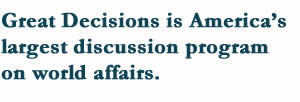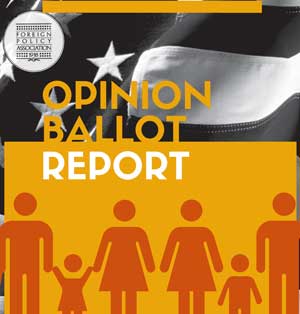Middle East Realignment
Great Decisions 2012 | Topic 1

After the Arab Spring
by Augustus Richard Norton
The popular revolts and upheaval of the Arab Spring have radically changed the face of the Middle East. What lies ahead for the Middle East’s transition to democracy? What are the prospects for the governments that have held out in this new order? With many longtime U.S. allies ousted, how will the U.S. recalibrate its relations with the new regimes?
Read a sample from the Briefing Book article
Watch an introduction to the Television Series episode
Take the Spring Quiz for "Middle East realignment"
Latest News
Middle East Realignment Latest News
- 'Arab Spring,' Factor Conducive to Proliferation of Terrorist Organizations - AllAfrica.com
- In Bahrain, Arab Spring Hopes Are Freezing Over - Wall Street Journal (blog)
- After Arab Spring, Surveillance in Egypt Intensifies - The Intercept - First Look Media
- Candid Discussions: Avinoam Bar-Yosef on the State of Israel and Jewish Diaspora Relations
- Candid Discussions: Touraj Daryaee on Ancient Iranian Empires’ Approach to Foreign Affairs
Related Organizations
-
Brookings Doha Center
The Brookings Doha Center (BDC) undertakes independent, policy-oriented research on the socioeconomic and geopolitical issues and transitions facing Muslim majority states and communities today, including issues focusing on U.S.-Muslim world relations.
-
International Crisis Group
The rapid spread and escalation of unrest underlined the magnitude of events, but their pace makes the direction of change uncertain. Events are unfolding quickly, and on this web page Crisis Group will gather all of its material on the current protests, background information and analysis, as well as links to key external sources.
-
Middle East Partnership Initiative
The Middle East Partnership Initiative (MEPI) is a regional program that helps citizens in the Middle East and North Africa develop more pluralistic, participatory, and prosperous societies. From within the Near Eastern Affairs Bureau at the State Department, MEPI advances U.S. foreign policy goals by supporting citizens’ efforts at economic, social, and political empowerment, expanding opportunities for women and youth, and helping communities work alongside governments in shaping their own futures. MEPI’s activities underscore President Obama and Secretary Clinton’s commitment to democracy and civil society in the region, and follow the approach the President laid out in his Cairo speech: engaging with peoples as well as governments, in a spirit of mutual respect and rooted in a commitment to universal values.
-
Freedom House
Freedom House is an independent watchdog organization that supports the expansion of freedom around the world. Freedom House supports democratic change, monitors freedom, and advocates for democracy and human rights. Since its founding in 1941 by prominent Americans concerned with the mounting threats to peace and democracy, Freedom House has been a vigorous proponent of democratic values and a steadfast opponent of dictatorships of the far left and the far right.
-
Muftah
Muftah represents a new voice in Middle East and North Africa (MENA) policy making. In Arabic, the term “muftah” signifies an “opening” or “something which opens”, and is most frequently used to refer to a key. For the founders of Muftah, the “key” to crafting effective U.S. foreign policy towards MENA is understanding the region from within, and not exclusively in terms of U.S. interests. Accordingly, Muftah challenges policy makers to look at the region through a MENA-focused lens, which captures the varying interests and competing forces that continue to shape the region. Muftah supports this endeavor by illuminating the internal issues that face MENA and its countries, from developments in domestic politics and national economies, to the influence of religion and youth culture upon these societies. Muftah also explores both the relationship between the United States and the governments in MENA, as well as the relations between MENA countries and the impact of their changing alliances and animosities on the global stage.
Recommended Readings
-
Rock the Casbah: Rage and Rebellion Across the Islamic World
by Robin Wright
A decade after the 9/11 attacks, this groundbreaking book by a preeminent reporter takes readers deep into the struggle withA decade after the 9/11 attacks, this groundbreaking book by a preeminent reporter takes readers deep into the struggle within the Muslim world where a growing movement defies and challenges extremism and repudiates Osama bin Laden, his deviant doctrine, and his violent disciples.
-
The New Arab Revolt: What Happened, What it Means, and What Comes Next
by the Council on Foreign Relations
The New Arab Revolt: What Happened, What It Means, and What Comes Next sets the intellectual stage for understanding the revolutions in the Middle East. This collection brings together more than sixty articles, interviews, congressional testimony, and op-eds from experts and thought leaders, including Bernard Lewis, Fouad Ajami, Richard Haass, Lisa Anderson, Martin Indyk, Isobel Coleman, Aluf Benn, Dirk Vandewalle, and Nassim Nicholas Taleb. The volume includes seminal pieces from Foreign Affairs, ForeignAffairs.com, and CFR.org. In addition, major public statements by Barack Obama, Hillary Rodham Clinton, Hosni Mubarak, Muammar al-Qaddafi, and others are joined by Egyptian opposition writings and relevant primary source documents. -
The Arab Awakening : America and the Transformation of the Middle East
by the Saban Center, Brookings Institution
Even the most seasoned Middle East observers were taken aback by the events of early 2011. Protests born of oppression and socioeconomic frustration erupted throughout the streets; public unrest provoked violent police backlash; long-established dictatorships fell. How did this all happen? What might the future look like, and what are the likely ramifications for the United States and the rest of the world? In The Arab Awakening, experts from the Brookings Institution tackle such questions to make sense of this tumultuous region that remains at the heart of U.S. national interests. -
On the State of Egypt: What Made the Revolution Inevitable
by Alaa Al Aswany
From one of Egypt’s most acclaimed novelists, here is a vivid chronicle of Egyptian society, with penetrating analysis of all the most urgent issues—economic stagnation, police brutality, poverty, the harassment of women and of the Christian minority, to name a few—that led to the stunning overthrow of the Mubarak government. Al-Aswany addresses himself to all the questions being asked within Egypt and beyond: who will be the next president, and how will he be chosen in a land where heretofore only simpletons, opportunists and stooges involved themselves with elections? What role will the Muslim Brotherhood play? How can democratic reforms be effected among a people used to such contradictions as the religiously observant policeman who commits torture? In a candid and controversial assessment of both the potential and limitations that will determine his country’s future, Al-Aswany reveals why the revolt that surprised the world was destined to happen. -
Revolution in the Arab World
by Foreign Policy magazine
Economic stagnation, ancient autocrats, and stifling censorship -- these are just a few of the grievances that are responsible for the upheaval currently threatening to sweep away the Arab world’s ruling regimes. Foreign Policy’s section on this revolutionary wave, which has irrevocably altered the governments in Tunis and Cairo and has other Arab leaders quaking in their boots, provides on-the-ground reporting and cutting-edge analysis to help you understand this historic moment.
Great Decisions 2024 cover image.







